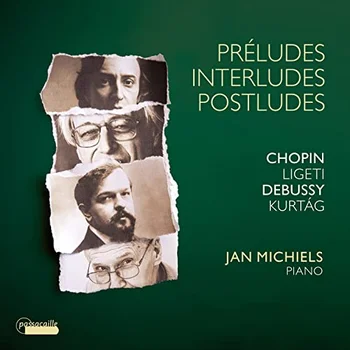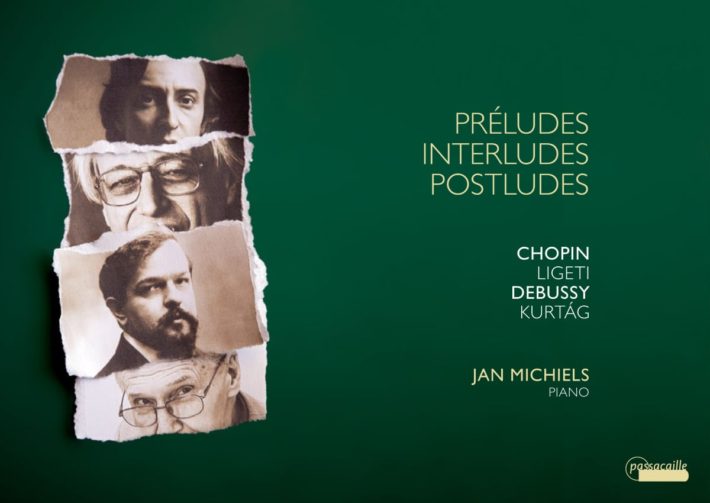In his new project – the complete Chopin and Debussy prcludes along with selected works by Kurtàg and Ligeti – Jan Michiels invites the listener into the “world of the Parisian salon”, as the booklet states. Michiel indeed goes the lengths to recreate this 19th-century Proustian concert experience, right down to the pianos he uses. Playing Chopin and Debussy on an 1894 Erard is not new by any means but the intriguing twist is his idea of featuring Ligeti (1923-2006) and Kurtàg (1926-) on an 1876 Steinway: certainly a creative way of stepping backwards into time.

I didn’t quite know what to expect with the Ligeti, being more accustomed to recordings by Aimard (the composer’s preferred interpreter) and Idil Biret on modern instruments. Vertige from Book II (CD 2, track 3) reveals some considerable differences. The 1876 Steinway, despite being a little less powerfully resonant and a little more plunky than its 20th century counterpart, lends an eerie sound to the upper registers that always seem to call from faraway. There’s also the interpretation: Michiel’s opening passage is quite dry and the accented notes are pointillistic, resulting in a cool, almost calculatedly sinister character. Aimard, by comparison, creates a mellow sheet of sound, and with a slightly better crescendo, transforms it into something almost terrifying.
In slower selections like En Suspens (CD 1, track 16), Michiels introduces us to different dimensions of both the work and the instrument. We have a delicate, consonant melody that has a dichotomous relationship with the dissonances: while the two are at clear odds tonally, both are essential in creating a balance of complementary colors. I liked how his performance shed light upon the changing dynamic between personas throughout–the disquietude that was almost hesitant at the beginning becomes a much more menacing presence at the end.
The Erard has rather a crystalline sound profile compared to the 1897 Erard that we hear on another ‘period’ recording of the Debussy Préludes by Jos van Immerseel (Channel Classics, 1992). For selections like Brouillards (CD 1, track 2), this doesn’t quite work given Michiel’s clarity where we need something more hazy. La cathédrale engloutie (CD 1, track 8), however, is more successful: there’s more variety and better nuancing of key strikes. We can hear a difference between the ascending parallel intervals of the opening and the delicate bell clangs starting at 0:35, though Immerseel ultimately has the imaginative edge when it comes to evoking the grandeur of the cathedral.
Ondine (CD 1, track 13) is one of the more difficult preludes musically given its extremely capricious nature. Michiels does a nice job here, though, with quick turnarounds of articulation and seamless voice-leading, all while maintaining the transient quality at the heart of the prelude. Les sons et les parfums tournent dans l’air du soir (CD 1, track 18) moves a bit too fast for me to savor Debussy‘s otherworldly harmonies (something Gieseking’s 1938/39 recording does more successfully). But perhaps Michiels’ intent was to capture a dancelike swing that we don’t always hear at slower tempos.
The Chopin set on the whole is lovely, with highlights being a particularly coy Prelude No. 1 and Prelude No. 3 with its exceptional yet effortlessly clear left hand ostinato. Prelude No. 24 (“Raindrop”) slides a bit too much with the rubato but still brings out the shift between translucence and power. Prelude No. 28 (CD 2, track 1) was by far my favorite: tender and dreamy, it brought out Michiels’ beautiful phrasing and the more mellow side of the Erard.
The sound engineering captures the minute details of each instrument’s temperament as well as how Michiel responds accordingly, making for an interesting comparison as we go back and forth between composers. His liner notes, interspersed with quotations, fit the ambience of the Proustian theme, if you will, with a meandering and poetic feel. While those expecting a more cut-and-dry analysis might find the commentary hard to follow, a second read will reveal the performer’s interesting insights and emphasis on creativity. I found the contemporary works especially effective with their unconventional performance practice, but the arrangement and choice of pieces as a whole also convincingly embrace the album’s concept. A solid effort and illuminating listen.
Recommended Comparisons
Biret | Immerseel | Driver | Cortot
Préludes, Interludes, Postludes
Jan Michiels – Piano
Passacaille, CD PAS1118



















